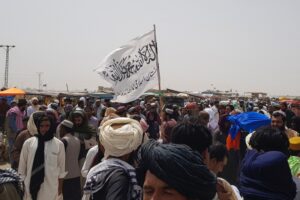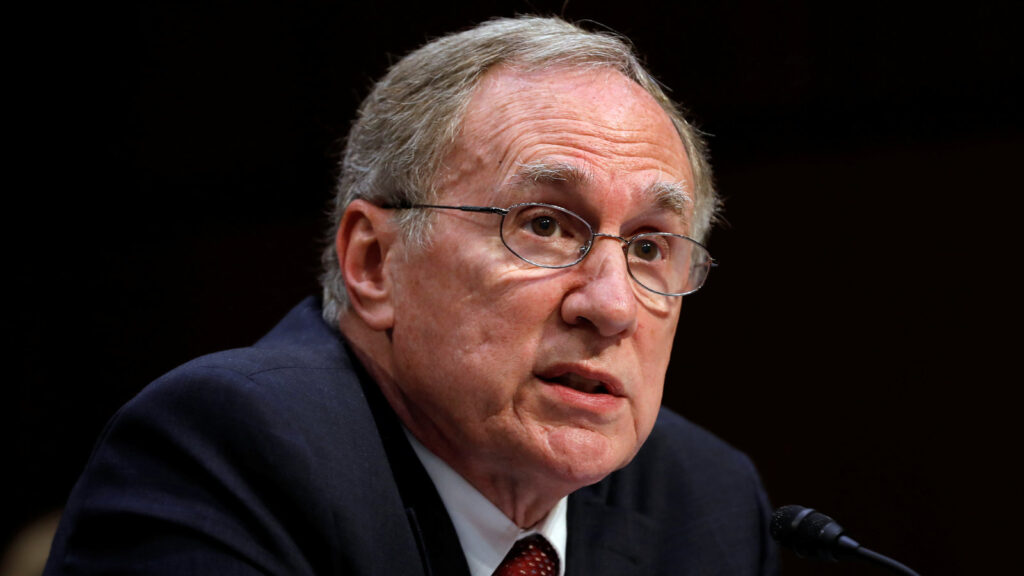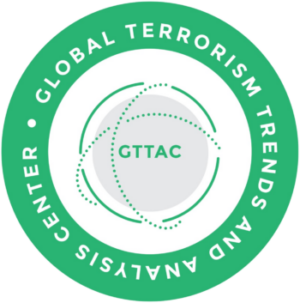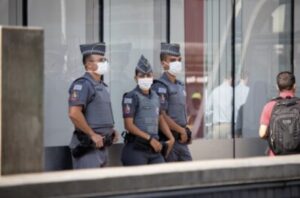The Global Terrorism Trends and Analysis Center (GTTAC) documents the thousands of terrorist attacks—globally and domestically—that occur each year. GTTAC, by detailing various dimensions of each attack, familiarizes analysts, policymakers, scholars, and journalists with patterns of terrorism. The center defines terrorist attacks as the threatened or actual use of illegal force and violence by a nonstate actor to attain a political, economic, religious, or social goal through fear, coercion, or intimidation. Data are collected daily. Updates are published annually in the Department of State’s report to Congress on terrorism, known as the Annex of Statistical Information: Country Reports on Terrorism.
The GTTAC Speaker Series
Follow GTTAC on Twitter for all of the Latest News
For the very latest list of GTTAC presentations, visit
GTTAC.com/speaker-series-presentations/
September 21, 2023
“France and the Historical Dynamics of Terrorism”

|
Hall Gardner is Professor and former Chair (1993-2019), Department of History and Politics, American University of Paris. He is the editor of Geopolitical Turmoil in the Balkans and Eastern Mediterranean (Springer/Palgrave, 2023) and author of Toward an Alternative Transatlantic Strategy : Biden, the EU and the ‘new’ Multilateralism ; Vers une Stratégie Transatlantique Alternative – Biden, l’UE et le nouveau multilatéralisme, Éditions Ginkgo, april 2022 (in French and English same book); IR Theory, Historical Analogy and Major Power War (Palgrave, 2019); World War Trump: The Risks of America’s New Nationalism (Prometheus Books, March 2018); Crimea, Global Rivalry, and the Vengeance of History (New York: Palgrave Macmillan, 2015); The Failure to Prevent World War I (Ashgate, 2015); NATO Expansion and the US Strategy in Asia (New York: Palgrave Macmillan, 2013); The Ashgate Research Companion to War: Origins and Prevention, primary editor with Oleg Kobtzeff (Ashgate: February 2012); Averting Global War: Regional Challenges, Overextension, and Options for American Strategy (New York: Palgrave, 2007; paperback version April 2010); American Global Strategy and the War on Terrorism (Ashgate, 2005; revised and updated, 2007), plus a novel, Year of the Earth Serpent Changing Colors (Ibidem-Verlag, 2023). His other books and articles can be found on his website: www.hallgardner.com. |
July 20, 2023
“A Look into Yemen: Understanding the Houthis’ Past, Present, and Future”

| Dr. Marta Furlan is the Research Officer at Free the Slaves, an international humanitarian organization. Her areas of expertise include human rights protection, armed groups, and civil conflicts. Marta holds a Ph.D. in International Relations from the University of St Andrews (Handa Center for the Study of Terrorism and Political Violence), where she wrote her dissertation on armed groups’ governance practices – and impact on civilians – in Yemen, Syria, and Iraq. Marta has published extensively in leading academic journals, such as the Middle East Journal, Studies in Conflict & Terrorism, and Civil Wars. She has also contributed chapters to three books on the topics of armed groups’ approach to International Humanitarian Law (IHL) and armed groups-civilians dynamics in conflict-affected areas. Prior to joining FTS, Marta worked as a research consultant on Yemen and Syria for the NGO Geneva Call. |
July 11, 2023
“Mindfulness-based intervention (MBI) for resilience-building among vulnerable populations”

Dr. Sophia Moskalenko is a Programme Management Specialist at the United Nations’ Office of Counter-Terrorism, Behavioral Insights Hub. After receiving her Ph.D. in social and clinical psychology from the University of Pennsylvania, she focused her research on radicalization, self-sacrifice, martyrdom, and disinformation. As a research fellow at the National Consortium for the Study of Terrorism and Responses to Terrorism (NC-START) Dr. Moskalenko has worked on projects commissioned by the Department of Defense, Department of Energy, Department of Homeland Security, and Department of State. She serves as a consultant to the European Commission, the Harry Frank Guggenheim Foundation and Georgia State University’s Cyber Security Unit. Dr. Moskalenko is a certified Mindfulness instructor, and is the designer of the Mindfulness-Based Initiative for Building Resilience Against Radicalization.
Dr. Moskalenko has co-authored several books, including award-winning Friction: How conflict radicalizes them and us; The Marvel of Martyrdom: The power of self-sacrifice in the selfish world; and Pastels and Pedophiles: Inside the Mind of QAnon.
June 26, 2023
“The Language of Far-Right Extremism in the U.S.”

|
Dr. Arie Perliger is a Professor at the University of Massachusetts Lowell. Between 2010-2016 he served as a faculty and the Director of Terrorism studies at the United States Military Academy at West Point, and between 2016-2023 as the director of the graduate program in security studies at the School of Criminology and Justice Studies at UMass Lowell. In the past 20 years, Dr. Perliger was engaged in an extensive study of issues related to terrorism and political violence, security policy and politics including: the nexus of security and climate change, politics and extremism of the Far Right in Israel, Europe, and the US, Middle Eastern Politics, and the applicability of Social Network Analysis to the study of political violence. His studies appeared in nine books and monographs and in numerous articles and book chapters, cited in more than 2000 academic texts. His recent book, “American Zealots – Inside Right-Wing Domestic Terrorism,” which was published by Columbia University Press, provides an in-depth analysis of the history and contemporary trends of the violent American far-right. Dr. Perliger was also engaged in training practitioners from various agencies such as the FBI, CIA, and ICE. Additionally, he provided professional briefings to high-rank officials from the government and military, such as The Secretary of the Army, Army Chief of Staff, and SOCOM, AFRICOM, NORTHCOM, and JSOC commanders. Tess Hemmila is a third-year Ph.D. student in Criminology at the University of Massachusetts Lowell. She studies political violence and terrorism with particular interest in far-right extremism and religious extremism. Her research investigates online mobilization of far-right collective violence, far-right insider threats in law enforcement, far-right online discourse, and digital vigilantism after acts of political violence. Tess earned an MA in Security Studies at University of Massachusetts Lowell and a BA at Dordt University. As an undergraduate, she was an intern at the Federal Bureau of Investigation. |
June 5, 2023
“Brazil’s Tri-Border with Paraguay and Argentina: A Hub of Illicit Trade with Global Impact” featuring Rashmi Singh
Rashmi Singh is a Professor at the Postgraduate Program in International Relations at PUC Minas, Brazil. She holds a PhD in International Relations from the London School of Economics and Political Science, UK. She is co-founder and co-director of the Research Network on Terrorism, Radicalization and Transnational Crime (TRAC). She has over 20 years of experience working on the topic of terrorism with a focus on the Middle East and South Asia (especially Islamist terrorism but also extreme right-wing terrorism). More recently, she has expanded her focus to include organized crime, specifically the terrorism-crime nexus. Once again, the main focus of her work is the Middle East and South Asia, although her research interests have also expanded to include Latin America (specifically the Southern Cone region). Dr. Singh is an Associate Editor of Perspectives on Terrorism and on the editorial boards of various international journal including, International Politics, International Journal of Conflict and Violence and Asian Journal of International Peace and Conflict. She is fluent in English, Hindi, Urdu and Portuguese and has a working knowledge of Arabic. She has conducted extensive fieldwork in the Middle East and South Asia. Prior to joining PUC Minas, Dr. Singh was a Lecturer of Terrorism Studies at the Handa Center for the Study of Terrorism and Political Violence (CSTPV) at the University of St. Andrews (Scotland) from 2008-2016. She has also served as a member of the World Economic Forum’s Global Agenda Council on Terrorism between 2013 and 2014. She has a long history of working as a consultant, trainer and teacher for various government agencies, international and military organizations across North America, Europe, South Asia, and Latin America.
May 26, 2023
“The development of the global jihadist movement and the response from Europe” Featuring Teun van Dongen
Teun van Dongen is an independent researcher in the field of terrorism and extremism. Previously, he worked as a policy analyst for The Hague Center for Strategic Studies and the International Centre for Counter-Terrorism. He also taught at Leiden University, the Free University and the Inholland University of Applied Sciences. He gained a PhD degree from Leiden University with a dissertation about effectiveness in counterterrorism. He wrote two books (in Dutch) about terrorism and counterterrorism. For more information about him, see www.teunvandongen.com.
April 19, 2023
“Extremist Islam: Recognition and Response in Southeast Asia” Featuring Kumar Ramakrishna
February 27, 2023
“Irregular Warfare in the Indian Subcontinent”
Jaideep Saikia is a Terrorism & Conflict analyst with over two dozen peer reviewed papers on security and strategy. He is also the author and or editor of several books, including the bestselling “Terror Sans Frontiers: Islamist Militancy in North East India”, “Frontier in Flames: North East India in Turmoil”, “Terrorism: Patterns of Internationalisation” and “Mind over Matter”.
January 19, 2023
“Understanding Islamic State Sanctuaries in Southeast Asia”
Kenneth Yeo is a Senior Analyst from the International Centre for Political Violence and Terrorism Research (ICPVTR), a specialist centre of the S. Rajaratnam School of International Studies (RSIS) based in Singapore. He is also a Ph.D. candidate of RSIS, researching the militant surrenders phenomenon. He specializes in Islamist terrorism and insurgency in Southeast Asia.
December 8, 2022
“Terrorism in Central Asia: The threat that does not seem to come home”
Presented by Raffaello Pantucci
Raffaello Pantucci is a Senior Fellow at the International Center for Political Violence and Terrorism Research (ICPVTR) at the S. Rajaratnam School of International Studies (RSIS). His research there focuses on Central Asia as well as managing a broad ranging team looking at Global Emergent Threats. He is a widely published author in the academic and public press, and he has advised governments in Europe, North America and Asia on counter-terrorism strategies.
September 22, 2022
“Will Afghanistan Become a Terrorism Safe Haven Once Again?” Featuring Ahmad Shah Mohibi
Presented by Ahmad Shah Mohibi
Ahmad Shah Mohibi is the Founder of Rise to Peace and former US-Counter-Terrorism Adviser in Afghanistan. Frequently provides news analysis and commentary to media outlets, including the Washington Post, CNN, CBS News, MSNBC, NBC News, CNBC, Business Insider, FOX News, TRT World, Aljazeera, Washington Examiner, The Washington Post, Ariana News, The Diplomat Magazine, and Tolo News.
July 21, 2022
“The US and Europe: Conflicting Views on the Global War on Terrorism”
Featuring Professor Hall Gardner
Hall Gardner is a Full Professor (and former Chair 1993-2019) of the Department of History and Politics at the American University of Paris. He was a Visiting Professor at the Johns Hopkins School of Advanced International Studies-Nanjing (1988-89) and SAIS-Washington (1989-90)—before moving to the American University of Paris in September 1990.
May 23, 2022
“White Supremacists Speak”
Presented by Dr. Anne Speckhard
Anne Speckhard, Ph.D., is Director of the International Center for the Study of Violent Extremism (ICSVE) and serves as an Adjunct Associate Professor of Psychiatry at Georgetown University School of Medicine. She has interviewed over 700 terrorists, violent extremists, their family members, and supporters in various parts of the world including in Western Europe, the Balkans, Central Asia, the Former Soviet Union, and the Middle East.
May 12, 2022
“Reexamining Boko Haram’s Past, Present, and Future”
Presented by Jacob Zenn
Jacob Zenn is an adjunct professor on African Armed Movements and Violent Non-State Actors in World Politics at the Georgetown University Security Studies Program (SSP) and a fellow on African and Eurasian Affairs for The Jamestown Foundation in Washington DC. He wrote the book, Unmasking Boko Haram: Exploring Global Jihad in Nigeria, which was published in April 2020 by Lynne Rienner in association with the Handa Centre for the Study of Terrorism and Political Violence, University of St Andrews. Zenn has also written on international law and security for Jamestown’s Foundation’s Terrorism Monitor, Militant Leadership Monitor, and Eurasia Daily Monitor; Jane’s Intelligence Review-China Watch; the Central Asia-Caucasus Analyst; and for academic journals.
April 21, 2022
“What Do We Know About The Designation or Proscription of Terrorist Organizations?”
Featuring Dr. Brian J. Phillips
Dr. Brian J. Phillips is a Reader (Associate Professor) in the Department of Government at the University of Essex in the UK. He is also an affiliated professor at the Center for Research and Teaching in Economics (CIDE) in Mexico City. He researches terrorism, civil conflict, organized crime, and related topics. He has published research on the U.S. Foreign Terrorist Organization list (2019), and wrote a co-authored article analyzing which types of groups end up on various countries’ terrorist lists (2021). This year, his co-authored book “Insurgent Terrorism: Intergroup Relationships and the Killing of Civilians” was published by Oxford University Press. Before starting his academic career, Dr. Phillips was enlisted for four years in the U.S. Marines.
March 10, 2022
“Insurgency and Terrorism in North-East India”
Presented by Jaideep Saikia
Jaideep Saikia’s presentation [Approximately: 20 Minutes] will discuss insurgency and terrorism in North-East of India with active cross-border linkages with China, Myanmar, and Bangladesh. This will be followed by a 20 minute Q&A session open to audience participation.
Jaideep Saikia is a Terrorism and Conflict Analyst and a Fellow, Irregular Warfare Initiative Fellow, West Point USA. He is also the author of several books on security and strategy and has served the Governments of India and Assam in security advisory capacities including in the National Security Council Secretariat of India as an Expert on North East India. He was a member of the Indian delegation for the “Track II Dialogue” with Bangladesh, China, and Myanmar. Jaideep Saikia’s domain expertise includes a) Insurgency in the North-East b) Islamist Terrorism c) Bangladesh d) India-China Boundary [Eastern Sector] e) Counter Radicalisation f) “India’s National Security Doctrine” and g) Peace-Building with Belligerent Groups.
February 24, 2022
“Post-Taliban Counterterrorism Issues in Afghanistan and Pakistan”
Presented by Dr. Asfandyar Mir
Dr. Asfandyar Mir is a Senior Expert at the United States Institute of Peace. Previously, he was a lecturer in the political science department at Stanford University. He also held fellowships at Stanford’s Center for International Security and Cooperation. His research interests include the international relations of South Asia, U.S. counterterrorism policy and political violence, and social media politics — with a regional focus on Afghanistan and Pakistan. Mir’s research has appeared in peer-reviewed journals, such as International Security, International Studies Quarterly and Security Studies. He received his PhD in political science from the University of Chicago and a master’s and bachelor’s from Stanford University.
January 13, 2022
“The Islamic State in Africa: Emergence, Evolution, and Future of the Next Jihadist Battlefront”
Presented by Dr. Jason Warner
Dr. Jason Warner is an Assistant Professor in the Department of Social Sciences at the United States Military Academy in West Point, New York, and an Associate in the Combating Terrorism Center (CTC), also at the United States Military Academy, where he directs the CTC’s Africa research profile.
His research focuses on terrorism in Africa (especially the activities of the Islamic State and al-Qaeda in Africa, and suicide bombing) and the foreign policies of African states and external states towards the continent.
Dr. Warner holds a Ph.D. in African Studies from Harvard University; an M.A. in Government from Harvard University; an M.A. in African Studies from Yale University; and a B.A. with highest honors in International Studies from UNC-Chapel Hill.
November 18th, 2021
What the Return of the Taliban means for Jihadists

Presented by Mina al-Lami
Mina al-Lami heads the jihadist media monitoring team a BBC Monitoring. She’s a native Arabic speaker with 15 years of experience closely tracking the militant and media activities of jihadist groups and their use of online platforms and technology. Mina has written extensively on jihadist developments and messaging and regularly appears on TV, radio and at international events.
The Taliban’s return to power in August not only dominated news room discussions and international headlines, but gripped the jihadist community, most of whom saw it as a victory for jihad and a model to be emulated elsewhere. But jihadists aren’t one big happy family and from the outset questions and concerns were raised, particular by hardliners, about the Taliban’s pragmatic approach and whether or not jihadists could support it. Another key question that remains unanswered is the exact nature of the relationship between al-Qaeda and the Taliban, and whether jihadists will find a safe haven in today’s Afghanistan. Islamic State group (IS), the black sheep of the jihadist community, has further complicated matters by waging war against the Taliban and asking the awkward questions about the Afghan group’s political and diplomatic moves that other jihadists don’t dare to ask.ews.
October 14th, 2021
Contemporary Data Issues in Extremism Research
Presented by Dr. Wesley S. McCann
Wesley S. McCann is an Assistant Professor in the Department of Criminology, Law and Society. He has published numerous articles dealing with terrorism, immigration, and criminal law and courts, and is the author of National Security and Policy in America: Immigrants, Crime, and the Securitization of the Border (Routledge, 2020) as well as recent publications on CBRN Terrorism in leading terrorism journals.
An expert on extremism, preventing/countering violent extremism (P/CVE), and criminal law, he is currently researching why non-state actors pursue chemical, biological, radiological, and nuclear weapons; whether military intervention influences the tactics and weapons terrorist groups pursue and use; the impact of the Department of Homeland Security’s 287(g) program on local crime; and the correlates of anti-immigrant sentiment. He is also leading a research team on state judicial selection requirements and processes to inform federal judicial reform efforts.
September 23rd, 2021
Terrorism and Political Violence in South-Asia
Presented by Dr. Jennifer Santiago Oreta
Jennifer Santiago Oreta, Ph.D. is currently an Assistant Professor of the Department of Political Science, and Director of the Ateneo Initiative for Southeast Asian Studies (AISEAS) of the Ateneo de Manila University, Philippines. Dr. Oreta is currently a US-ASEAN scholar under the Fulbright program at TraCCC (Terrorism, Transnational Crime, and Corruption ) at George Mason University.
Under the administration of President Benigno S. Aquino III (2010-2016), Dr. Oreta was appointed as Assistant Secretary for Policy in the Office of the Presidential Adviser on the Peace Process (OPAPP) of the Philippine government. Professor Oreta was part of the Technical Working Group on Normalization representing the Philippine government in the peace talks with the Moro Islamic Liberation Front and led and initiated the crafting of a strategy paper on dealing with the communist insurgents outside the peace table. Now, Professor Oreta is a member of the Board and concurrent Executive Director of the Human Security Advocates (HSA).
April 1, 2021
Terrorism and Counterterrorism in Somalia
Presented by Dr. Daisy Muibu
Dr. Daisy Muibu is an Assistant Professor at the University of Alabama in the Department of Criminology and Criminal Justice. Her research is focused on policing and counterinsurgency from a variety of perspectives that include: police legitimacy and local law enforcement responses to terrorism; citizens perceptions towards formal, private and informal policing and paramilitary forces; and the role of foreign fighters within insurgent groups. Daisy was also Peace and Violence Research Fellow at AU’s School of Public Affairs department and a recipient of various research grants, such as the United Nations Initiative on Peace and Reconciliation in Somalia grant, the Association for the Study of The Middle East and Africa, and the American University Doctoral Student Research Scholarship. Dr. Muibu also has years of experience working on rule of law and criminal justice reform, as well as counterterrorism in regions of Kenya and southern Somalia.
March 11, 2021
Non-state Organizations and Political Violence: A Quantitative Perspective
Presented by Victor Asal
Mr. Asal spoke on the quantitative analytical perspective on tracking political violence and terrorism. Victor Asal (Ph.D. University of Maryland, 2003) is Director of the Center for Policy Research and a Professor of Political Science at the University at Albany. He is affiliated with the National Consortium for the Study of Terrorism and Responses to Terrorism (START), a DHS Center of Excellence. His research focuses on nonstate actor violence and the causes of political discrimination particularly related to ethnicity and gender. He also researches nuclear crisis behavior and pedagogy. Asal has been involved in research projects funded by the Defense Advanced Research Projects Agency, Defense Threat Reduction Agency, The Department of Homeland Security, The National Science Foundation, The Office of Naval Research, and the Department of Homeland Security.
February 11, 2021
Approaching Counter-Terrorism in Sub-Saharan Africa in the Covid-19 Era – The Case of ISIS in Central & West Africa
Presented by David Otto
David Otto is an international counterterrorism and organized crime specialist. He is an active consultant, trainer, and capacity-building specialist for NATO, the United Nations, U.S. Africa Command, the U.S. Department of Defense, and other corporate bodies on trend analysis of Africa Terror Networks. He is a pioneer expert for the Interpol Global Counter Terrorism Strategy set up by a group of five globally accredited subject-matter experts. He contributes toward the shaping of the Africa Counter Terrorism Strategy in the Sahel, Lake Chad Basin, Great Lakes, and Horn of Africa. He was the lead consultant for counterterrorism program design for Global Risk International UK Ltd. He has researched Africa terror networks for the past 15 years and developed an enormous network on the continent. He is a Certified Master Anti-Terrorism Specialist and Certified Financial Crime Examiner for the Anti-Terrorism Accreditation Board. He also is a Visiting Professor at East China University of Political Science and Law Institute of Strategic Studies.
January 14, 2021
A Practitioner’s Perspective on the State of the Terrorist Threat

Presented by Russ Travers
Mr. Travers took office as the Acting Director of the National Counterterrorism Center (NCTC) in August 2019. He also has held other leadership positions within NCTC since 2015, including Senior Counselor to the Director, Acting Director of the Office of Data Strategy and Innovation, and Chief Data Officer for both NCTC and the Office of the Director of National Intelligence.
From 2013 to 2015, Mr. Travers served as the Special Assistant to the President and Senior Director for Transnational Threat Integration and Information Sharing on the National Security Council. He has also served tours as Deputy Director for Policy Support at the Defense Intelligence Agency, the Defense Intelligence Officer for General Purpose Forces, and the Senior Civilian Advisor to the Director for Intelligence, J2, Joint Chiefs.
December 17, 2020
Terrorists, Technology, Tactics: Understanding How Violent Non-State Actors Engage in Organizational Learning
Presented by Dr. Daveed Gartenstein–Ross
Dr. Gartenstein–Ross is a scholar, practitioner, author of more than 25 books and monographs, and entrepreneur who is the Founder and Chief Executive Officer of Valens Global. The International Herald Tribune has described him as “a rising star in the counterterrorism community.” In 2019, he led Valens Global’s efforts to support the drafting, threat assessment, and crafting of priority actions for the U.S. Department of Homeland Security’s Strategic Framework for Countering Terrorism and Targeted Violence, which was released in September 2019 and has subsequently guided DHS’s approach to confronting terrorism and other forms of sub-state violence. That document has received widespread acclaim, with the New York Times editorializing that the document “focuses unapologetically on right-wing terrorism, particularly white supremacist extremism,” which constitutes “a shift that is both urgently needed and long overdue.”
November 6, 2020
Terrorism in the Time of the Pandemic
Presented by Dr. Rohan Gunaratna
Dr. Gunaratna is Professor of Security Studies and founder of the International Centre for Political Violence and Terrorism Research at Nanyang Technological University in Singapore. He served as a counterterrorism instructor for GIGN, CTSO, D88, U.S. Navy SEALs, the Swiss Federal Police, the New York Police Department, and the Australian Federal Police. He has conducted field research in conflict zones in Afghanistan, Algeria, Bangladesh, Colombia, Egypt, Indonesia, Israel, Kashmir, Pakistan, Philippines, Sri Lanka, Thailand, and Uzbekistan. Author and editor of 20 books including Inside Al Qaeda: Global Network of Terror, Gunaratna is also the lead author of Jane’s Counter Terrorism, a handbook for counterterrorism practitioners.
November 19, 2020
Breaking the ISIS Brand
Presented by Dr. Anne Speckhard
Dr. Speckhard is Director of the International Center for the Study of Violent Extremism and serves as an Adjunct Associate Professor of Psychiatry at Georgetown University’s School of Medicine. She has interviewed more than 700 terrorists, their family members, and supporters in various parts of the world, including Western Europe, the Balkans, Central Asia, the former Soviet Union, and the Middle East. In the past five years, she has conducted in-depth psychological interviews of more than 250 ISIS defectors, returnees, and prisoners as well as 16 al-Shabaab cadres. From these interviews, she has developed the Breaking the ISIS Brand Counter Narrative Project materials, which include more than 200 brief counternarrative videos of terrorists denouncing their groups as un-Islamic, corrupt, and brutal. The video content has been used in more than 150 Facebook and Instagram campaigns globally.
October 22, 2020
Boko Haram and Other al-Qaeda– and ISIS–Linked Sub-Saharan African Groups
Presented by Dr. Jacob Zenn
Dr. Zenn is an adjunct professor on African armed movements and violent nonstate actors in world politics from Georgetown University’s Security Studies Program. He is the author of Unmasking Boko Haram: Exploring Global Jihad in Nigeria, published in April.
October 8, 2020
American Zealots: Inside Right-Wing Domestic Terrorism
Presented by Dr. Arie Perliger
Dr. Perliger is a Professor and the Director of the graduate program in security studies at the School of Criminology and Justice Studies, University of Massachusetts, Lowell. During the past 20 years, he has been engaged in an extensive study of issues related to terrorism, security policy, and the politics and extremism of the far right in Israel, Europe, and the United States. His work have appeared in nine books and monographs, and in numerous articles and book chapters, and have been cited in more than 1,300 academic texts. His recent book, American Zealots: Inside Right-Wing Domestic Terrorism, describes the entire ideological spectrum of the American far right.




